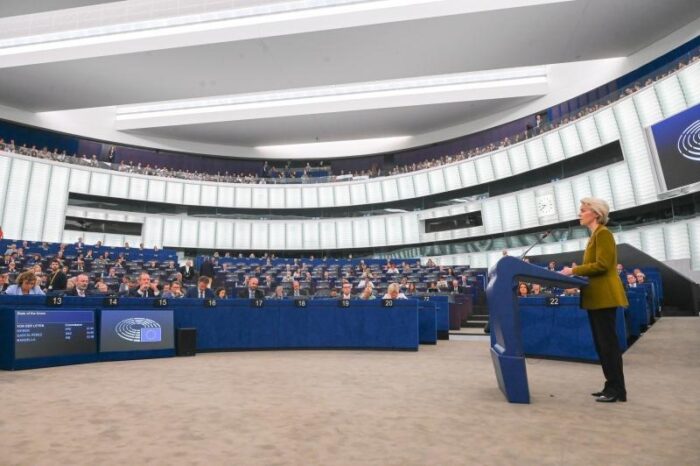The Progressive Post
Why not finally a European state?

The EU is institutionally exhausted and under high populist pressure due to its dysfunctional governance and lack of democratic legitimacy. With the reform impetus of the far-reaching proposals of citizens as result of the conference on the Future of the EU, and, on the other hand, the pressure of the Ukraine war, the EU should go back to its old ambition: to write itself a constitution, and to finally create a European federal state.
Thinking about Europe’s institutional architecture is not really a thrilling new question. Instead, it is the most painful challenge Europe has been trying to tackle since it departed, in 1992, with the Maastricht Treaty, toward an ever-closer union. The wisdom of its architects, Helmut Kohl, François Mitterrand and Jacques Delors, was to never define the ever and the closer. 30 years after that treaty, the EU is what it is, and nobody can really say. What can be said, however, is that the EU today is neither a union forever nor any closer than in 1992, as the European architects of that time might have wished for.
Taking the ‘ever‘: the UK has already left; an Italian party calls itself – and its programme – ‘ItalExit’; and if it’s not Italexit, Öxit or Frexit are also in the air, obviously more to catch people’s resentment, but still showing the fragility of the EU system. Not to mention Hungary or Poland, which are certainly rather staying in the EU for EU money than for any ambition of an ever-closer union. Discontentment about the EU is in the air. And even worse is the ignorance: the EU is no longer present in public debates. The banking crisis, austerity, the difficult management of refugee flows, and the alienation of citizens from the EU system certainly have something to do with it.
With ‘closer‘, things are not any better. On the good side of the equation, one can point to the reform impetus brought by the Conference on the Future of the EU that came up, in May 2022, after a year-long consultation of thousands of European citizens, with 49 quite substantial reform ideas, such as abandoning the veto rights of member states, or social equality for European citizens throughout the EU. The idea to call for a new convention and to open an institutional reform procedure after article 48 of the Treaty of the European Union (TEU) is in the air, and has recently been highlighted by the President of the European Commission, Ursula von der Leyen, who called for a Convention in her speech of 14 September. But if we will really see a constitutional convention is less than sure.
It would be European ‘business as usual’: the postponement of every urgent institutional question – if Europe would not be confronting what many call a ‘hot autumn’: social unrest due to inflation, the general economic downturn and the energy crisis under the pressure of the war in Ukraine. While EU insiders are endlessly debating rather technical questions such as Spitzenkandidaten (most citizens don’t even know about these), the war in Ukraine has catapulted Europe to the bloody reality of power and interests. And the EU is experiencing, again, that it has interests but can barely defend them properly. The war confronts Europe with its dysfunctional way of decision-making, its lack of autonomy and sovereignty, and ailing capacity to decide unanimously – all the questions that the Maastricht Treaty, 30 years ago, wanted to fix. Or even worse: that nobody wanted to pursue anymore after the constitutional treaty failed in 2003.
Devoid of institutional capacity, Europe seems to be searching for a new unity in the wake of the war, defending the territorial integrity of Ukraine, but forgetting, as if struck by Alzheimer’s disease, that it has told citizens for 70 years that the EU is a peace project; and secondly, that the EU’s eternal discussions were about overcoming nation-states in a federal European order. This double blindness, or even self-denial, is doing no good to Europe. And the unity around arming Ukraine is already crumbling, the sanctions against Russia have clearly failed and most European societies are not keen to stay in the cold for Kyiv for the sake of a largely self-damaging European energy policy.
So, what to do about Europe’s badly needed new architecture in this crucial moment?
Recently, a speech by German Chancellor Olaf Scholz in Prague brought some hope: Scholz – like Emmanuel Macron in several (overheard) speeches before – urged for radical European reforms. He painted a gloomy picture of the EU’s current situation: a war, energy problems, and social unrest everywhere. And he mentioned the enormous lack of trust in the EU’s institutional system.
On the other side, the EU’s challenges are increasing: inflation, a much too weak social pillar, the ongoing Ukraine humanitarian crisis, a common European asylum policy that is not under control, and further enlargements on the horizon. Ukraine has received an accession promise, while the Balkan countries have been waiting for years, and even Turkey is still in the process, even if the negotiations are suspended for the time being. Scholz asked whether 36 or so countries should join an EU that already does not function well.
He concluded that Europe needs a grand strategy and a grand institutional (re-)design. Scholz tried to spell out bits and pieces of it, for example, a different arrangement of the working procedures of Commissioners and tightening decision-making structures. This is all good. Yet, the same things have already been debated over and over during the 2003 discussions of the European Constitution – with no result.
The hope is that today, Europe is under more pressure and dares to cross the federal Rubicon, the jump it has been lingering around for 30 years. For this, it may help that the German coalition treaty at least mentions the perspective of a European federal state.
A European federal state, based on equal rights for European citizens, building a fully-fletched European democracy, linking back sovereignty to European citizens in a participatory way, guaranteeing autonomous European regions – Scotland, no longer in the EU but eager to re-join again, or Catalonia could pave the way – in a two-chamber system as constitutive pillars, might be more in reach and more accepted by European citizens as one may think. The results of the citizens’ consultations show that very clearly. A European state that is getting rid of the deadlocking EU-Council structure and that promotes, out of the European rescue package of 2020, a veritable fiscal constitution, taking, en passant, all countries into the Euro and guaranteeing social and cohesion policies, may, as illusionary it may sound, be the only way out of the European mess. Europe would find its way back to the promise it once had, that deepening and widening belong together. Finally, through a state-building exercise, it wound conquer what it needs most: sovereignty!
Photo credits: Sutterstock/Robsonphoto




